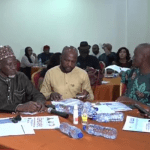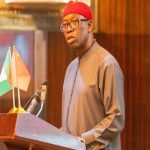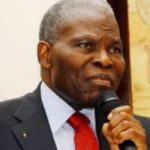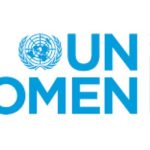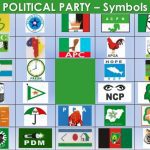A National dialogue on party systems has called on political parties in Nigeria to be guided by their Constitutions and Codes of Conduct to strengthen the nation’s democracy.
Participants, comprising development partners and the civil society community, say signing of peace accords in the build up to elections would become unnecessary once political parties abide by the laws governing them.
The role of political parties in a democracy remains pivotal to the success of governance and Nigeria has continued to build on the gains of its hard earned democracy.
Since the return of democracy in Nigeria in 1999, the country has had seven consecutive elections in a multi party system which produces its leaders.
This roundtable brings together development partners and representatives of civil society groups to fashion out ways of better improving the operations of political parties in the country.
Inclusivity of women and persons with disabilities.
In his paper, “The political party system-1999 to Date: Gains, Challenges and What Next?”, Otive Igbuzor says proportional representation is still lacking in the party system.
Absence of credible membership lists, failure in payment of dues, poor organisation of party structures and absence of internal democracy, vote buying and violence are some of the challenges common with political parties.
The Director, Democracy and Governance, NILDS, speaks on Political Parties and Inclusive Practices in Nigeria.
He refers to some of the Institute’s recommendations after a thorough research on the nation’s party system.
A National dialogue on party systems has called on political parties in Nigeria to be guided by their Constitutions and Codes of Conduct to strengthen the nation’s democracy.
Participants, comprising development partners and the civil society community, say signing of peace accords in the build up to elections would become unnecessary once political parties abide by the laws governing them.
The role of political parties in a democracy remains pivotal to the success of governance and Nigeria has continued to build on the gains of its hard earned democracy.
Since the return of democracy in Nigeria in 1999, the country has had seven consecutive elections in a multi party system which produces its leaders.
This roundtable brings together development partners and representatives of civil society groups to fashion out ways of better improving the operations of political parties in the country.
Inclusivity of women and persons with disabilities.
In his paper, “The political party system-1999 to Date: Gains, Challenges and What Next?”, Otive Igbuzor says proportional representation is still lacking in the party system.
Absence of credible membership lists, failure in payment of dues, poor organisation of party structures and absence of internal democracy, vote buying and violence are some of the challenges common with political parties.
The Director, Democracy and Governance, NILDS, speaks on Political Parties and Inclusive Practices in Nigeria.
He refers to some of the Institute’s recommendations after a thorough research on the nation’s party system.
A National dialogue on party systems has called on political parties in Nigeria to be guided by their Constitutions and Codes of Conduct to strengthen the nation’s democracy.
Participants, comprising development partners and the civil society community, say signing of peace accords in the build up to elections would become unnecessary once political parties abide by the laws governing them.
The role of political parties in a democracy remains pivotal to the success of governance and Nigeria has continued to build on the gains of its hard earned democracy.
Since the return of democracy in Nigeria in 1999, the country has had seven consecutive elections in a multi party system which produces its leaders.
This roundtable brings together development partners and representatives of civil society groups to fashion out ways of better improving the operations of political parties in the country.
Inclusivity of women and persons with disabilities.
In his paper, “The political party system-1999 to Date: Gains, Challenges and What Next?”, Otive Igbuzor says proportional representation is still lacking in the party system.
Absence of credible membership lists, failure in payment of dues, poor organisation of party structures and absence of internal democracy, vote buying and violence are some of the challenges common with political parties.
The Director, Democracy and Governance, NILDS, speaks on Political Parties and Inclusive Practices in Nigeria.
He refers to some of the Institute’s recommendations after a thorough research on the nation’s party system.
A National dialogue on party systems has called on political parties in Nigeria to be guided by their Constitutions and Codes of Conduct to strengthen the nation’s democracy.
Participants, comprising development partners and the civil society community, say signing of peace accords in the build up to elections would become unnecessary once political parties abide by the laws governing them.
The role of political parties in a democracy remains pivotal to the success of governance and Nigeria has continued to build on the gains of its hard earned democracy.
Since the return of democracy in Nigeria in 1999, the country has had seven consecutive elections in a multi party system which produces its leaders.
This roundtable brings together development partners and representatives of civil society groups to fashion out ways of better improving the operations of political parties in the country.
Inclusivity of women and persons with disabilities.
In his paper, “The political party system-1999 to Date: Gains, Challenges and What Next?”, Otive Igbuzor says proportional representation is still lacking in the party system.
Absence of credible membership lists, failure in payment of dues, poor organisation of party structures and absence of internal democracy, vote buying and violence are some of the challenges common with political parties.
The Director, Democracy and Governance, NILDS, speaks on Political Parties and Inclusive Practices in Nigeria.
He refers to some of the Institute’s recommendations after a thorough research on the nation’s party system.
A National dialogue on party systems has called on political parties in Nigeria to be guided by their Constitutions and Codes of Conduct to strengthen the nation’s democracy.
Participants, comprising development partners and the civil society community, say signing of peace accords in the build up to elections would become unnecessary once political parties abide by the laws governing them.
The role of political parties in a democracy remains pivotal to the success of governance and Nigeria has continued to build on the gains of its hard earned democracy.
Since the return of democracy in Nigeria in 1999, the country has had seven consecutive elections in a multi party system which produces its leaders.
This roundtable brings together development partners and representatives of civil society groups to fashion out ways of better improving the operations of political parties in the country.
Inclusivity of women and persons with disabilities.
In his paper, “The political party system-1999 to Date: Gains, Challenges and What Next?”, Otive Igbuzor says proportional representation is still lacking in the party system.
Absence of credible membership lists, failure in payment of dues, poor organisation of party structures and absence of internal democracy, vote buying and violence are some of the challenges common with political parties.
The Director, Democracy and Governance, NILDS, speaks on Political Parties and Inclusive Practices in Nigeria.
He refers to some of the Institute’s recommendations after a thorough research on the nation’s party system.
A National dialogue on party systems has called on political parties in Nigeria to be guided by their Constitutions and Codes of Conduct to strengthen the nation’s democracy.
Participants, comprising development partners and the civil society community, say signing of peace accords in the build up to elections would become unnecessary once political parties abide by the laws governing them.
The role of political parties in a democracy remains pivotal to the success of governance and Nigeria has continued to build on the gains of its hard earned democracy.
Since the return of democracy in Nigeria in 1999, the country has had seven consecutive elections in a multi party system which produces its leaders.
This roundtable brings together development partners and representatives of civil society groups to fashion out ways of better improving the operations of political parties in the country.
Inclusivity of women and persons with disabilities.
In his paper, “The political party system-1999 to Date: Gains, Challenges and What Next?”, Otive Igbuzor says proportional representation is still lacking in the party system.
Absence of credible membership lists, failure in payment of dues, poor organisation of party structures and absence of internal democracy, vote buying and violence are some of the challenges common with political parties.
The Director, Democracy and Governance, NILDS, speaks on Political Parties and Inclusive Practices in Nigeria.
He refers to some of the Institute’s recommendations after a thorough research on the nation’s party system.
A National dialogue on party systems has called on political parties in Nigeria to be guided by their Constitutions and Codes of Conduct to strengthen the nation’s democracy.
Participants, comprising development partners and the civil society community, say signing of peace accords in the build up to elections would become unnecessary once political parties abide by the laws governing them.
The role of political parties in a democracy remains pivotal to the success of governance and Nigeria has continued to build on the gains of its hard earned democracy.
Since the return of democracy in Nigeria in 1999, the country has had seven consecutive elections in a multi party system which produces its leaders.
This roundtable brings together development partners and representatives of civil society groups to fashion out ways of better improving the operations of political parties in the country.
Inclusivity of women and persons with disabilities.
In his paper, “The political party system-1999 to Date: Gains, Challenges and What Next?”, Otive Igbuzor says proportional representation is still lacking in the party system.
Absence of credible membership lists, failure in payment of dues, poor organisation of party structures and absence of internal democracy, vote buying and violence are some of the challenges common with political parties.
The Director, Democracy and Governance, NILDS, speaks on Political Parties and Inclusive Practices in Nigeria.
He refers to some of the Institute’s recommendations after a thorough research on the nation’s party system.
A National dialogue on party systems has called on political parties in Nigeria to be guided by their Constitutions and Codes of Conduct to strengthen the nation’s democracy.
Participants, comprising development partners and the civil society community, say signing of peace accords in the build up to elections would become unnecessary once political parties abide by the laws governing them.
The role of political parties in a democracy remains pivotal to the success of governance and Nigeria has continued to build on the gains of its hard earned democracy.
Since the return of democracy in Nigeria in 1999, the country has had seven consecutive elections in a multi party system which produces its leaders.
This roundtable brings together development partners and representatives of civil society groups to fashion out ways of better improving the operations of political parties in the country.
Inclusivity of women and persons with disabilities.
In his paper, “The political party system-1999 to Date: Gains, Challenges and What Next?”, Otive Igbuzor says proportional representation is still lacking in the party system.
Absence of credible membership lists, failure in payment of dues, poor organisation of party structures and absence of internal democracy, vote buying and violence are some of the challenges common with political parties.
The Director, Democracy and Governance, NILDS, speaks on Political Parties and Inclusive Practices in Nigeria.
He refers to some of the Institute’s recommendations after a thorough research on the nation’s party system.




